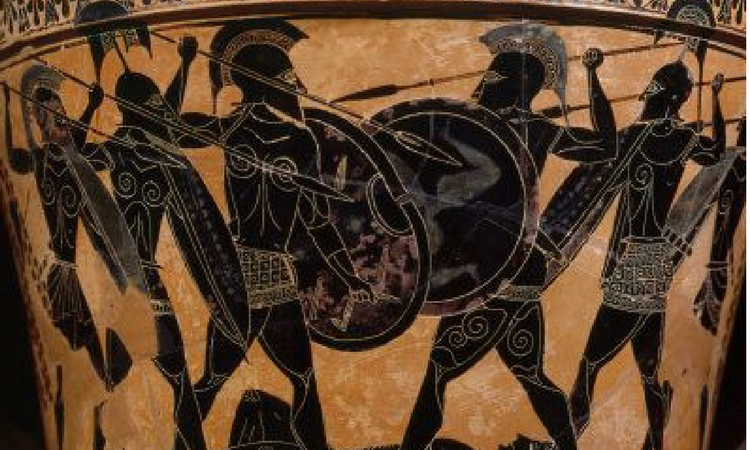 Those Who Can’t Learn From History, Are Condemned To Repeat It. But Why?
Those Who Can’t Learn From History, Are Condemned To Repeat It. But Why?
An old friend and I are planning a cruise to the Aegean islands this spring.
I’ve known Dean for decades. First, back in the ’80’s, when we were brought together by our mutual loathing for rail mass transit. But 21st century Denver’s unreasoning lust for a 19th century technology won out in the end: FastTracks, as we predicted, is billions of dollars over budget and decades behind schedule. The long, miserable track record of other failed projects like this around the county made no difference to voters.
But why? Because they swallowed, whole hog, the Chamber of Commerce’s line of light rail BS.
Somewhere along the way, however, I lost track of Dean. Which isn’t really the right way to put it. I had it from a usually reliable source that he had actually died after a long bout with prostate cancer.
But then one night, as I was opening mail in my “campaign headquarters” (my grown son’s former bedroom), what to my wondering eyes should appear, but a check from Dean to help fuel one of my runs for the Colorado House of Representatives. “What,” I thought, “a check from beyond the grave?!” No, of course not; the guy I met a few days later for breakfast, while, like me, somewhat worse for wear, was no ghost.
In any event, we’ve booked a cruise this spring to see Greece and the Aegean islands. So, I’ve been boning up on my Greek history.
Athens, Sparta And The War That Doomed Greece.
One of the books I’ve listened to is Thucydides’ History of the Peloponnesian War (431-404 BC). Considered one of the two fathers of the study of history, Thucydides was an Athenian and an eyewitness and participant in the events he described.
In effect a civil war, it was fought with the savagery that is typical of internecine conflict. Its conclusion marked the end of Greece’s Golden Age, and left its two primary combatants, Athens and Sparta, burnt out husks of their former selves.
The other father of history, Herodotus, also a Greek, chronicled the earlier Persian Wars (499 to 449 BC) that pitted the overwhelming might of the Persian empire against a ragtag band of Greek city states led by Athens and Sparta. Against all odds, the Greeks prevailed and the nascent idea of democracy was not strangled in its Athenian crib.
As the Peloponnesian War began, Athens was near the pinnacle of its influence, wealth, and matchless cultural achievements. But from a scrappy democracy, imperial pretensions were beginning to appear. What had been the “coalition of the willing” that had banded together to turn back the Persian threat a mere 18 years earlier, was now a restive Athenian empire: the Delian League. Athen’s increasingly heavy-handed treatment of League members provoked its rival, Sparta, and contributed to the outbreak of the war.
Initially, Pericles, the Athenian statesman and general, persuaded his fellow citizens to adopt a defensive strategy, withdrawing behind the “Long Walls” that connected the city to Piraeus, the nearby port where its battle tested and nearly invincible navy lay could launch raids against Spartan territory.
More than Athen’s equal on land, Sparta pursued a scorched earth policy, squeezing Athenians into their walled city where they watched their olive trees and vineyards being ravaged. But the Athenians, with their control of the sea lanes, could securely resupply themselves.
Stalemate: both sides settled in for a grinding siege.
Athens: Democracy to Bullying Imperial Power.
But the crowded conditions behind Athen’s walls caused a devastating plague to break out in the war’s second year. Thousands perished, including Pericles and most of his family. Thucydides himself contracted the disease, but survived, writing about it in gruesome detail. Social order collapsed, since most Athenians believed they were doomed anyway.
Remarkably Athens was able to rebound from this calamity. Over the next 15 years, and with increasing ruthlessness on both sides, the war dragged on inconclusively.
Until Athens, in 415 BC, under the generalship of the brilliant, but unscrupulous Alcibiades, launched a massive sea borne invasion of Syracuse. Like Athens, Syracuse was a democratic a city state. It’s crime was that it was a Spartan ally.
The invasion ended in disaster for Athens, with its fleet at the bottom of the Mediteranean and the entire expeditionary force either slaughtered or sold into slavery. While the war dragged on in desultory fashion for years thereafter, the ending was a foregone conclusion: ruin for all of Greece. The way was cleared for Alexander the Great to subjugate the entire peninsula.
But why? Because Athens had gone from the birthplace of democracy. To a bullying imperial power.
America, Israel And Our Unnecessary Wars.
The United States has now been fighting wars in the Muslim Middle East for nearly 20 years. We’ve kicked over more hornets’ nests than you can shake a stick at: Afghanistan. Iraq. Libya. Syria. Yemen. All fruitless. All enormously expensive. All blood soaked for both us and our opponents. All with no end in sight.
But why? To make the world safe for Israel.
The Jewish dominated, neoconservative movement has played an enormously influential role in American foreign policy since at least the 1960’s. Although it’s tenets have varied based on the needs of the moment, in recent years the primary focus of neocons has been Israel and the Middle East. The movement has deep roots in the Jewish American community. It grew out of the Jewish monthly magazine, Commentary, originally published by the American Jewish Committee. The American State Department, rife with neocons, has become a virtual low-level department in the Israeli Ministry of Foreign Affairs when it comes to the Mideast. When Israel says “Jump,” our State Department asks, “How high?”
President Trump’s appointment of David Friedman, an Orthodox Jew, to be the US ambassador to Israel does nothing to dispel this perception. Friedman is cut from the same extreme right wing cloth as Israeli Prime Minister, Benjamin Netanyahu.
Friedman’s Senate confirmation hearings were contentious, with a number of Israeli and American Jewish groups opposing it. Friedman denounced his Jewish opponents in what can scarcely be described as diplomatic terms: they are “far worse than kapos”-Jews who betrayed their fellows in the Nazi death camps. While Friedman later attempted to walk back this language, his liberal Jewish critics weren’t mollified. Several Jewish members of Congress opposed the nomination, as did five former US Ambassadors to Israel, who declared him “unqualified.”
No more helpful was the President’s recent announcement that the US embassy will be moved to Jerusalem. Nearly every former US ambassador to Israel thought it was a bad idea.
The Israel Lobby.
And when not actually in government, Israel also exercises enormous influence over our foreign policy through a network of organizations described by John Mearsheimer of the University of Chicago and Stephen Walt of the Harvard School of Government in The Israel Lobby. According to the authors, “No lobby has managed to divert U.S. foreign policy as far from what the American national interest would otherwise suggest, while simultaneously convincing Americans that U.S. and Israeli interests are essentially identical.”
Of course, Mearsheimer and Walt have been accused of anti-Semitism. Anyone who dares criticize Israel is, in the view of the Lobby, anti-Semitic. It’s the perfect weapon for shutting down any reasoned consideration of what would be America’s best interests in the Middle East.
Why Not An Honest Broker?
In 1956, Israel, England and France invaded Egypt and took control of the Suez Canal after Egyptian President Gamal Abdel Nasser nationalized the waterway. While the invasion was a military success, it was a diplomatic disaster for the three allies.
Under President Dwight Eisenhower, America was not yet in thrall to Israel; “Ike” played the crisis down the middle. The three aggressors withdrew from Egypt. The canal, which Egypt had blocked with sunken ships, was reopened. America still had the standing to act as an honest broker in the Middle East.
No more. In virtually the entire world, we are viewed as Israel’s handmaiden, its useful idiot. Is it an accident that we are fighting wars with so many Muslim countries that surround the state of Israel? And which consider nuclear armed Israel (although Israel is coy about its bomb) a threat to their existence?
Is America First?
One of the main reasons I was an early supporter of President Trump was that he promised to put “America First.” Is it surprising that some Jewish scholars, commentators, and organizations have criticized the President for even suggesting that Israel be moved down the pecking order? Unfortunately, with our never ending Mid-East wars, it appears that the Lobby is continuing to have its way. And that Israel is back in the position to which it has long been accustomed: “We’re number one!”

 Those Who Can’t Learn From History, Are Condemned To Repeat It. But Why?
Those Who Can’t Learn From History, Are Condemned To Repeat It. But Why?


Seems to me Israel has always been able to defend itself pretty well. Let’s let them do it.
Couldn’t agree more. Thanks for the visit.